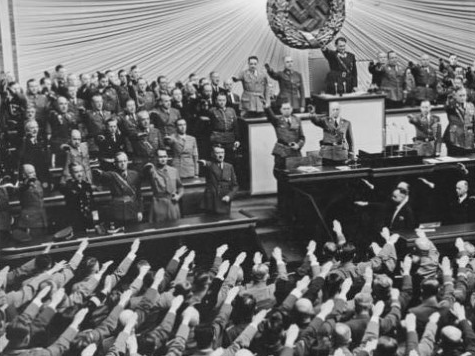President Barack Obama’s telephone call with Iran’s President Hassan Rouhani took place on the 75th anniversary of President Franklin Delano Roosevelt’s appeal to Adolf Hitler for peace in Europe. Roosevelt urged that “negotiations [between Germany and Czechoslovakia] be continued until a peaceful settlement is found.” Hitler merely pretended to want peace. Less than a year later, Germany invaded Czechoslovakia.
At the risk of tripping over Godwin’s Law, the analogy is a useful and instructive one as President Barack Obama appeals to the Iranian regime to renew negotiations over that country’s nuclear program. Ignoring the fact that Iran is violating UN Security Council resolutions, that it is backing mass murder in Syria and that it recently crushed a democratic uprising in its own boundaries, Obama is trusting Iran–again.
President Obama made much of a so-called “fatwa”–a religious ruling–that Iran’s so-called “Supreme Leader,” Ali Khamenei, allegedly made several years ago banning nuclear weapons. There is one problem: the fatwa does not exist. Even National Public Radio felt compelled to point that out last year, when the president and then-Secretary Hillary Clinton began citing an Iranian talking point in their own statements.
Even if such a fatwa did exist, there would be no reason to take it seriously as a basis for policy, much less intelligence about Iran’s activities and ambitions. A 2010 fatwa against terrorism, running in excess of 400 pages, by a respected Islamic scholar has hardly stopped Islamist terror. There is no more reason to take Khamenei’s fake “fatwa” seriously than Hitler’s very real protestations of Germany’s peaceful intentions.
On July 19, 1940, Adolf Hitler addressed the Reichstag in Berlin and made an appeal for peace with Britain–what he called “a last appeal to reason.” The two countries had already been at war for nearly a year, since the German invasion of Poland in September 1939. France had just surrendered, and the Battle of Britain had just begun. Hitler felt emboldened to offer peace terms from a position of historic strength.
Hitler’s speech was later dropped by German aircraft on sorties over Britain with the intent of encouraging pacifism. Today, only extremist conspiracy theorists believe that Hitler still wanted peace and had only been forced into war by “Jewish capitalist war-mongers.” Yet even as Iran’s president attacks “warmongering pressure groups” from the rostrum at the UN General Assembly, we are asked to trust his assurances.
On Monday, Israeli Prime Minister Benjamin Netanyahu, finding himself increasingly consigned to the role of Czechoslovakia in this re-enactment of Munich (an analogy used, incidentally, by Secretary of State John Kerry before Obama had backed down on Syria), struggled to praise Obama’s military resolve. Without an American deterrent, Israel faces an existential threat that it can only confront at great risk and cost.
The president said that the U.S. was “clear-eyed” about Iran’s nuclear program. Yet President Obama is only clear-eyed about his own “fatwa” fantasies–as was Prime Minister Neville Chamberlain in 1938, who trusted Hitler’s promises of peace. Roosevelt, a man to whom Obama likes to compare himself, soon learned he could not trust a dictator set on domination. Yet Obama keeps repeating the past errors of appeasement.
Image: ww2.today.com

COMMENTS
Please let us know if you're having issues with commenting.